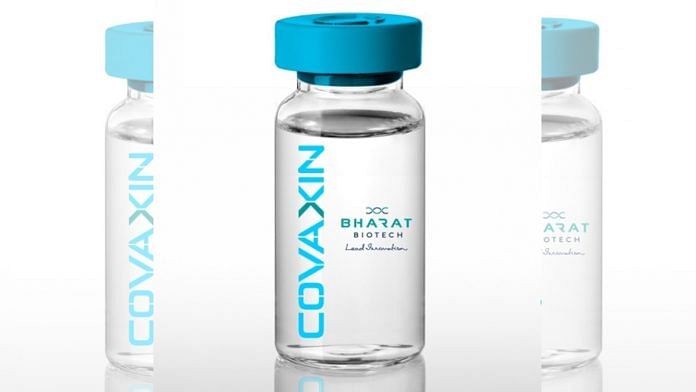New Delhi: The central government Tuesday clarified that lack of phase 3 data on Bharat Biotech’s Covaxin does not make it any less of a contender for emergency use authorisation (EUA) than vaccines by the Serum Institute of India (SII) or Pfizer. The government also asked citizens to “keep faith” in the country’s institutions.
After Pfizer and SII, Hyderabad-based pharmaceutical firm Bharat Biotech had Monday applied to the central drug regulator seeking EUA for Covaxin.
Phase 3 trial data of vaccines by SII and Pfizer are available, though not in the Indian population. Bharat Biotech’s vaccine candidate is a homegrown product developed in association with the Indian Council of Medical Research (ICMR).
Asked about the rationale behind Bharat Biotech’s EUA application, even though the company started phase 3 trials less than a month ago, ICMR Director General Dr Balram Bhargava said, “The temporary licensure or compassionate or emergency use … the regulator probably has to be satisfied with the risk-benefit ratio. The benefit has to be more than the risk, clearly, and in this emergency situation, if the benefit is more, he may consider.”
He added, “Numbers are there, you can call phase 1, phase 2, phase 3. From phase 1, we get safety data and also from phase 1 and 2 we get safety and immunogenicity data. We have both data for several days for many of these vaccines … for several months they are available. That is a reassuring point.”
Dr Bhargava also pointed out that the World Health Organization’s norms require a vaccine to be more than 50 per cent effective for use. “That number is available for different vaccines on a very small number of participants. Whatever phase 3 data that shows efficacy of 90-95 per cent is on a very small number of participants. Just 25-30. I would like to re-emphasise that the risk-benefit ratio is the most important in a pandemic.”
He added that the central drug regulator would undertake a deep and rigorous scrutiny of data.
Pfizer’s phase 3 efficacy analysis had looked at 94 confirmed cases of Covid-19 from among 43,538 participants. AstraZeneca, which had conducted trials for the vaccine being manufactured in India by SII, reported 62 per cent efficacy (two dose regimen) after an interim analysis of 131 Covid-19 cases.
The vaccine developed by Bharat Biotech is also the one that Dr Bhargava had aimed to launch by 15 August, in a controversial letter to principal investigators in July.
Meanwhile, NITI Aayog member (health) Dr Vinod Paul said, “Three vaccines are under consideration by the regulator and that is a very satisfying fact. We are looking at the world’s largest immunisation programme. Doubts should not be created on our regulator, our scientific institutions, on the National Technical Advisory Group on Immunisation (NTAGI).”
Dr Paul also appealed to people to not succumb to contrary opinions or fake news. “We are accountable and also fortunate to have so much capacity to make vaccines within the country. A vision has been set to vaccinate all who need it. But precautions should not be dropped either.”
He further said that the situation remains very dynamic and questions like licensure and even cost of vaccines remain open.
Also read: Covid outcomes ‘deceptively mixed’, make collective strategy impossible, Devi Sridhar says
Co-Win — an electronic dashboard for Covid vaccine
The health ministry gave an overview of the digital platform that has been developed for the vaccination drive which allows vaccinators and local governments to verify beneficiary data, log every day details, send electronic vaccination certificate to beneficiaries and give coverage as well as dropout reports.
It is based on an existing vaccine management platform called eVIN. Health Secretary Rajesh Bhushan said even though 30 crore people, comprising healthcare workers, elderly and those with comorbid conditions have been identified for priority vaccination, it will remain a voluntary process and nobody will be forced to take the vaccine. He also said that the existing immunisation infrastructure is sufficient to vaccinate the estimated three crore healthcare workers who are on the priority list.
Bhushan also gave an update on the status of committees at the state, district and block level that have been formed for vaccination drives. He laid down the five key principles of Covid-19 vaccination drive.
These are: “Orderly and smooth implementation driven by technology that could require preparation for one year or more; zero compromise of existing healthcare services, especially national programs and primary care; utilisation of the experience of elections and the universal immunisation programme; ensure people’s participation; and no compromise on scientific and regulatory norms, other SOPs.”
Also read: Health ministry planned Ayushman Bharat tableau for R-Day, panel says work on Covid theme



